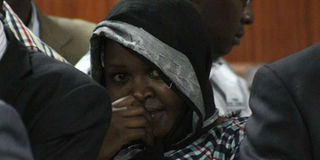Allegations paint the picture of a tragic betrayal of our trust

What you need to know:
One thing is for sure though: President Kenyatta is fighting corruption without the tools he needs.
Corruption is not really fought by government bureaucracies steeped in the traditions of theft, waste, and kuchemsha, as creative accounting is now called.
Kenyan media, some of the most robust in the world, are broken.
Newspapers are intimidated by an overbearing government and infiltrated by corruption rings, as alleged in the Kabura papers about “media gurus”.
The point is that the President stands to lose his biggest ally in the fight against corruption: You cannot fight corruption without a free press.
I have never come across a case of an investigating officer — and a senior police officer at that — paying bail for a suspect on serious criminal charges.
I have never seen a situation where police cynically arrest a suspect, take her to a police station, pretend to lock her up, sneak her to her house, and bring her back to the police station the following day, just to fool the public that something was being done about corruption.
What Ms Josephine Kabura alleges in her affidavit, if it is true, is manifest evidence of a broken government, where ministers conspire to steal from the people in the most immoral and cynical manner, systemic collapse of institutions gutted from within by venal individuals driven by greed, a mad feeding frenzy of the most repellent type.
One almost hopes that Ms Kabura is talking through her bonnet, that she is an inventor of stories with a lively imagination to boot.
Because the world she creates is one without hope, one in which we have lost our country to the people we trusted to manage it for us.
CREATIVE ACCOUNTING
One thing is for sure though: President Kenyatta is fighting corruption without the tools he needs.
Corruption is not really fought by government bureaucracies steeped in the traditions of theft, waste, and kuchemsha, as creative accounting is now called.
It is fought by that ragtag army of journalists, civil society, and an aware, engaged, activist population.
The President’s eyes cannot be everywhere at the same time, but there are eyes of Kenyans in every spot on this land.
Kenyan media, some of the most robust in the world, are broken.
Newspapers are intimidated by an overbearing government and infiltrated by corruption rings, as alleged in the Kabura papers about “media gurus”.
The chaotic implementation of the digital migration broke the commercial legs of many TV stations.
Mr Ezekiel Mutua, former director of information and now the CEO of the Kenya Film Board, was an enthusiastic campaigner against “analogue” media houses.
Now he is campaigning against pornography and other dangerous content on film and I wonder what platform Pang offers for him to do that.
I have been hearing rumours of an illegal regime of wiretaps against journalists and editors by the National Intelligence Service, underhand lifestyle audits, and the collection of the most private information — where your children go to school, where you live, what your habits are, and so on.
This information has allegedly gone into profiles which are available to junior civil servants and whose contents, according to the rumours, are freely discussed at Cedars, the Lebanese watering hole in Nairobi’s Kilimani neighbourhood.
I fervently hope that there is no truth in these rumours. If there is, then these Ceausescu-like tactics are crimes against the Constitution.
And they must be investigated and punished in the fullness of time.
IMPORTANCE OF FREE PRESS
The point is that the President stands to lose his biggest ally in the fight against corruption: You cannot fight corruption without a free press.
Those civil society types who chain themselves to gates and drive pigs through Parliament are another army against vice and waste of public wealth.
Today, civil society is on the back foot, not just because of government interference but in some cases because of its own chaotic and unethical conduct.
But the noisy folk whose beady eyes never miss a thing are exactly what you need to keep thieves off the public till.
Their absence is a disaster on a large scale.
Without them, Kanu would never have given up power and its beloved Section 2A.
All these things are connected.
Troubling questions have been raised about virtually every institution in this country.
If Ms Kabura is right, is this wanton “eating” in the entire government? And doesn’t that mean that the country is doomed?
Why did the Ethics and Anti-Corruption Commission clear former Devolution Cabinet Secretary Anne Waiguru? Why did they mount those phony raids?
How high does the rot in the Directorate of Criminal Investigations go? Who knew what and when did they know it? Why did State House call a press conference to announce that Ms Waiguru was as white as snow? Why at that time?
I am not convicting Ms Waiguru; she is innocent until a court says otherwise. But a woman who claims to know her very well has opened the door to hell and we recoil in horror.
How do we know the investigation by the so-called multi-agency task force is not another game of bloody smoke and mirrors?
This is a different world.





